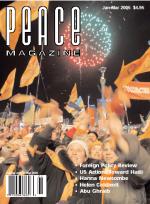
Peace Magazine Jan-Mar 2005, page 19. Some rights reserved.
Search for other articles by Dr. Norman L Epstein here
A few months ago, Prime Minister Paul Martin spoke at the United Nations. It was a good speech, filled with lofty platitudes of how the UN needed to reform itself and act expeditiously in Darfur. Martin carried that message at the recent APEC conference in Santiago and spoke passionately about the need to intervene in troubled spots like Sudan. He invoked "Responsibility to Protect," a document sponsored largely by the previous Liberal government and presented to the UN General Assembly.
"Responsibility to Protect" stipulates that when a sovereign state is unable or unwilling to protect its citizens from extreme harm, the international community must intervene. Whether or not the term "genocide" applies in Darfur, clearly at least the threshold has been met for meaningful intervention. Yet the world dithers.
For over a year, the conflict has pitted the government of Sudan and its militias (the Janjaweed) against African Muslims in Darfur. Government troops and the Janjaweed have practiced a scorched- earth policy of razing villages and perpetrating mass murder, rape, and torture of civilians to suppress an uprising of African rebels. Since March alone there have been 70,000 people who have perished in Displaced Persons' camps that are "virtual prisons without walls," according to UN High Commissioner for Human Rights Louise Arbour. Supplementing this figure is a conservative estimate of 50,000 killed by violence since the crisis started amassing an estimated death toll well in excess of 100,000. There are also close to two million people forcibly displaced. We do not know the exact number of dead, but we do know that this will reach exponentially higher numbers without determined action by the outside world.
There are parallels between this crisis and the Rwanda genocide. Ten years ago, the extremist government in Rwanda denied any connection to the Interahamwe, the militia responsible for the wanton slaughter of Tutsis. They said they were outlaws and criminals acting beyond government control. Subsequently, it was learned that the higher echelons of the Rwanda government were orchestrating the genocide; a few are standing trial now for crimes against humanity. A representative of the extremist Rwandan government sat on the UN Security Council and was aware of UN intentions, which he conveyed to the genocidaires.
In Sudan, the Khartoum regime likewise denies any connection to the Janjaweed who are committing the atrocities in Darfur against African Sudanese. The government insists that they are out-of-control outlaws. The UN seems to accept this explanation and continues to negotiate with the duplicitous regime in Khartoum, respecting its sovereignty. However, Human Rights Watch has shown incontrovertible evidence that not only is Khartoum supporting these militias, but members of the regime are orchestrating these crimes against humanity. Although Sudan does not sit on the Security Council, it enjoys elevated status on the UN Human Right Commission judging other states' human rights records--a veritable fox guarding the henhouse.
Jan Pronk, Kofi Annan's special emissary to Sudan, has said a much larger international force is needed. As of now, there are 300 African Union (AU) troops with an increase of 3000 more arriving in the coming weeks. This force is not nearly enough to police an area as large as France, and is limited in its mandate to intervene. It is trusted merely with the task of protecting international monitors who report ceasefire violations.
What is clearly needed is a larger and more robust peacekeeping force with a much wider mandate. Its mandate should include protecting civilians in IDP camps, ensuring security for humanitarian aid, and disarming the brutal Janjaweed. It can consist of primarily AU soldiers but needs the immense logistical support of the developed world.
As Romeo Dallaire has noted, these troops need a communication network, helicopters for transport, night goggles, armored vehicles, mobile medical teams, command infrastructure and so on. There also needs to be a No-Fly Zone protecting civilians from aerial bombardment. Furthermore, those responsible for crimes against humanity must be apprehended and prosecuted in the International Criminal Court.
A UN Security Council resolution would be preferred to authorize such a vigorous intervention. However, there is precedent in Bosnia and Kosovo to act outside the UN, particularly if the Security Council continues to respond with only hollow warnings and undefined measures.
As the prime minister has recently visited Sudan, he must now accelerate his efforts in energizing the international community to take seriously its responsibility to protect the people in Darfur. He must remind world governments that strategic interests must not trump human interests -- that sovereignty is not infinitely sacred and that a state surrenders its right to sovereignty if it kills and maims thousands of its citizens.
The prime minister deserves praise for being seized with the tragedy in Sudan and taking international leadership. However, he must steel his resolve and take bolder steps to assure swift and meaningful action in Darfur. This is a defining moment. Now is the time for Canada to transform itself from a respected middle power to a moral superpower.

Peace Magazine Jan-Mar 2005, page 19. Some rights reserved.
Search for other articles by Dr. Norman L Epstein here